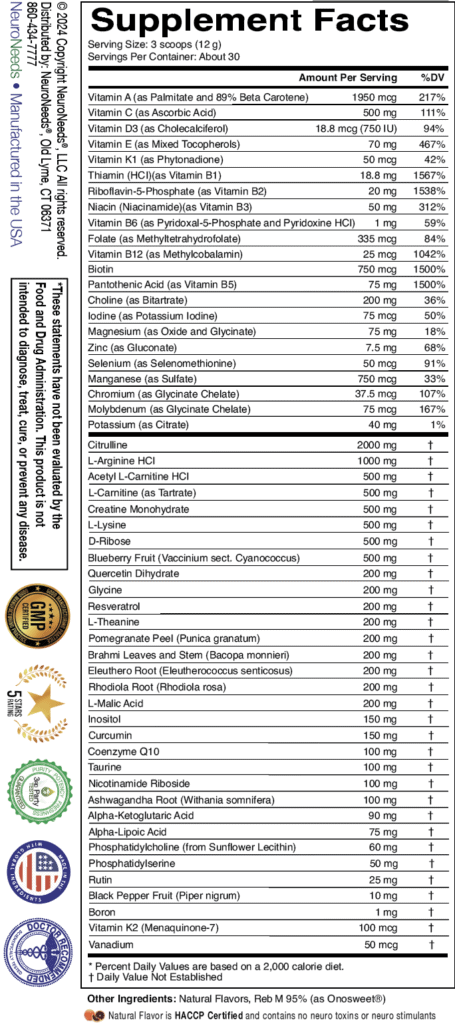$84
Pantothenic acid
Pantothenic acid, also known as vitamin B5, cannot be manufactured by humans and is obtained exclusively from the diet. Pantothenic acid is an enzyme cofactor by itself, as well as a necessary component for the formation of coenzyme A (CoA). CoA is a cofactor in a wide range of enzymes in energy metabolism and biosynthesis. Pantothenic acid is also a cofactor in complex I activity, the largest enzyme complex in the respiratory chain that makes cellular energy. Pantothenic acid deficiency is rare today outside of cases of extreme malnutrition or substantial gastrointestinal disease. Symptoms can include fatigue, depression, irritability, insomnia, abdominal pain, vomiting, burning and tingling feet, muscle cramps, and frequent upper respiratory infections. Side effects are rare at usual doses used in supplementation, other than nausea at the extreme dosing levels often recommended for acne.
Pantothenic acid in ActivNeeds

Pantothenic acid is added in order to provide a wide basis of nutrition, especially given the important role in energy metabolism. Furthermore, the dosing of pantothenic acid in ActivNeeds is high (but not extreme) in an attempt to increase the activity of respiratory chain complex I and coenzyme A (CoA) levels, which in turn might help to facilitate a wide range of metabolic processes in the body. Side effects are unexpected.
Pantothenic acid, also known as vitamin B5, is one of the eight B-complex vitamins. Pantothenic acid cannot be manufactured by humans and is thus a true vitamin, obtained exclusively from the diet.
Pantothenic acid is an enzyme cofactor, which means that it is a necessary component for enzyme function. Furthermore, coenzyme A (CoA) is synthesized from pantothenic acid. CoA is itself a cofactor in a wide range of enzymes in energy metabolism, including in carbohydrate, protein, and lipid metabolism, as well as in the Krebs cycle. CoA is also an important cofactor for enzymes in the biosynthesis fatty acids, cholesterol, and acetylcholine, among multiple other compounds. Pantothenic acid is also a cofactor of the acyl-carrier protein associated with complex I, the largest enzyme complex of the electron transport chain that produces the vast majority of cellular energy.
Pantothenic acid deficiency is rare today outside of cases of extreme malnutrition or substantial GI malabsorption such as chronic diarrhea. Symptoms can include acne, fatigue, depression, irritability, insomnia, abdominal pain, vomiting, burning and tingling feet, muscle cramps, and frequent upper respiratory infections.
Pantothenic acid is sometimes recommended for a variety of uses, including acne, adrenal insufficiency, aging, alcoholism, allergies, anxiety, athletic performance, asthma, attention deficit-hyperactivity disorder, autism, burning feet syndrome, carpal tunnel syndrome, celiac disease, chronic fatigue syndrome, colitis, conjunctivitis, convulsions, cystitis, dandruff, depression, diabetic nerve pain, dizziness, growth deficiency, immune dysfunction, infections (frequent), insomnia, hair loss or greying, headache, heart failure, hyperactivity, low blood sugar, irritability, low blood pressure, multiple sclerosis, muscular dystrophy, muscular cramps, nerve pain, obesity, osteoarthritis, Parkinson disease, premenstrual syndrome, prostate enlargement, respiratory disorders, rheumatoid arthritis, salicylate toxicity, shingles, skin disorders, tongue infections, wound healing, and yeast infections.
Pantothenic acid is a water-soluble vitamin and thus considered to be generally non-toxic. Doses as high as 10 grams are frequently given for acne, whereas nausea can occur, but is generally otherwise well tolerated.
Laboratory testing can reveal the presence of a deficiency of this nutrient, but is generally not likely to have clinically utility.
How and Why is Pantothenic Acid Used in ActivNeeds
Pantothenic acid is added to ActivNeeds in order to provide a wide basis of nutrition, especially given the important role of pantothenic acid in energy metabolism. Furthermore, pantothenic acid is included at high dosage in an attempt to increase complex I activity and CoA levels, which in turn might increase cellular energy and facilitate a wide range of metabolic processes in the body. As doses of 10 grams (10,000 mg) a day are generally tolerated for acne, side effects are rare with the dose used in ActivNeeds (75 mg).
Order ActivNeeds Today
Formulations










